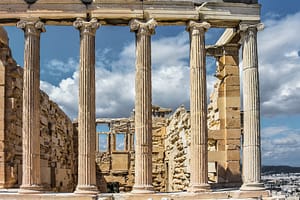The history of Greece must be one of the best-known in the world as its innovative city state, at its height over 2,000 years ago, set the stage for the development of the whole of Modern Europe. However, advanced civilization in the region didn’t begin with Classical Greece: it began in the Cycladic Islands, continued with the Minoan civilization on Crete, and migrated to the Peloponnese mainland at Mycenae in around 1900 BC.
The cradle of Western civilization began forming around 600 BC, and flowered with dramatic advances in science, astronomy, philosophy, drama, art, and mathematics. In 508 BC, the first democratic government in the world was instituted in Athens, and great monuments and landmarks took shape in forms never seen before. Athens spread its tentacles across the Mediterranean coastlines and Asia Minor, although several Persian invasions from the north during the Greco-Persian Wars threatened its stability. Rising conflicts between the non-unified Greek states resulted in the Peloponnesian War between 431 and 404 BC, which weakened the Athenian Empire and cause it to lose its premier position in the region.
By 27 BC, Greece was in Roman hands. Byzantine control began in the 9th century, followed by rule by the Franks in the 13th century. By the 15th century, the country was part of the Ottoman Empire and the Dark Ages had begun, although Venice mopped up a few islands. The Ottoman period was a harsh time for the Greek population although the invaders did not force Orthodox Christians to renounce their religion. The Greek War of Independence began in 1821 and saw fierce fighting, as well as involvement by Russia, England, and France until 1830, when the Greek state was finally recognized.
The coup years ended in 1974, just as Turkey invaded Northern Cyprus. The first democratic election was held, and a referendum ensured the monarchy would not be restored. In 1981, Greece joined the European Community, later to become the European Union, and eventually became part of the Eurozone.
Greek culture in the present day is a glorious mix of great classical and maritime heritage, music and dance, myth and legend, and a lifestyle that has developed over centuries. Even the ultra-modern, urbanite Athenians are still Greek to the core, and in rural districts and less-touristy islands, the local lifestyle is as laid back as they were at the beginning of the century. Although Greece has been heavily influenced by other cultures, it should be noted that Western cultures were equally influenced by the Classical Greek period, especially in the fields of literature, art, and architecture.
Still an influence on Greek culture is the Katharevousa form of Modern Greek, set half way between the classical language and the everyday Demotiki speech. Dialects are spoken in remote areas on the mainland and in the islands, with many dating back centuries and showing little sign of dying out. Greek Orthodox Christianity’s joyful festivals are linked strongly with the culture here, as the religion is very important. Greeks are proud of their country’s amazing past and its heritage is celebrated in the modern day.

